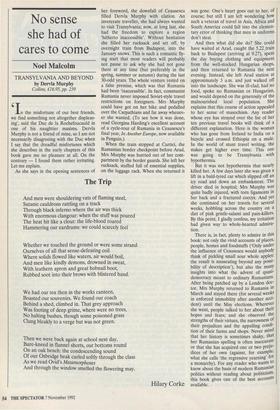No sense she had of cares to come
Noel Malcolm
TRANSYLVANIA AND BEYOND by Deryla Murphy Collins, £16.95, pp. 239 In the misfortune of our best friends, we find something not altogether displeas- ing', said the Duc de la Rochefoucauld in one of his naughtier maxims. Deryla Murphy is not a friend of mine, so I am not necessarily disagreeing with the Duc when I say that the dreadful misfortunes which she describes in the early chapters of this book gave me no pleasure at all. On the contrary — I found them rather irritating. Let me explain.
As she says in the opening sentences of
her foreword, the downfall of Ceausescu filled Deryla Murphy with elation. An inveterate traveller, she had always wanted to visit Transylvania; now, at long last, she had the freedom to explore a region 'hitherto inaccessible'. Without hesitation she filled her rucksack and set off, by overnight train from Budapest, into the January snows. This is such a romantic fly- ing start that most readers will probably not pause to ask why she had not gone there at any time (but preferably in the spring, summer or autumn) during the last 30-odd years. The whole venture rested on a false premise, which was that Rumania had been 'inaccessible'. In fact, communist Rumania never imposed Soviet-style travel restrictions on foreigners. Mrs Murphy could have got on her bike and pedalled over the Carpathians and far away whenev- er she wanted. (To see how it was done, read Georgina Harding's excellent account of a cycle-tour of Rumania in Ceausescu's final year, In Another Europe, now available in Penguin.)
When the train stopped at Curtici, the Rumanian border checkpoint before Arad, Mrs Murphy was hurried out of her com- partment by the border guards. She left her rucksack, stuffed full of essential supplies, on the luggage rack. When she returned it
The Trip
And men were shouldering vats of flaming steel, Satanic cauldrons rattling on a track Through black inferno where the air was thick With enormous clangour: when the stuff was poured The heat hit like a clout: the life-blood roared Hammering our eardrums: we could scarcely feel Whether we touched the ground or were some strand Ourselves of all that sense-defeating coil Where solids flowed like waters, air would boil, And men like kindly demons, drowned in sweat, With leathern apron and great hobnail boot, Rubbed soot into their brows with blistered hand.
We had our tea then in the works canteen, Boasted our souvenirs. We found our coach Behind a shed, climbed in. That grey approach Was footing of deep grime, where were no trees, No halting bushes, though some poisoned grass Clung bleakly to a verge but was not green.
Then we were back again at school next day, Bare-kneed in flannel shorts, our bottoms round On an oak bench: the condescending sound Of our Oxbridge beak curled softly through the class As we read Ovid's Metamorphoses And through the window smelled the flowering may.
Hilary Corke
was gone. One's heart goes out to her, of course; but still I am left wondering how such a veteran of travel in Asia, Africa and South America could fall into the elemen- tary error of thinking that men in uniforms don't steal.
And then what did she do? She could have waited at Arad, caught the 5.22 train back to Budapest (arriving at 9.27), spent the day buying clothing and equipment from the well-stocked Hungarian shops, and then returned to Rumania the next evening. Instead, she left Arad station at approximately 3 a.m. and just walked off into the landscape. She was ill-clad, had no food, spoke no Rumanian or Hungarian, and would depend on the generosity of the malnourished local population. She explains that this course of action appealed to her sense of masochism. Any reader whose eye has strayed over the list of her ten previous travel books will think of a different explanation. Here is the woman who has gone from Ireland to India on a bicycle and crossed Ethiopia on a mule. In the world of stunt travel writing, the stakes get higher ever time. This one was going to be Transylvania with hypothermia.
But it was not hypothermia that nearly killed her. A few days later she was given a lift in a bald-tyred car which slipped off an icy road and down an embankment. The driver died in hospital; Mrs Murphy was quite badly injured, with torn ligaments in her back and a fractured coccyx. And yet she continued on her travels for several weeks, hobbling across the country on a diet of pink gristle-salami and pain-killers. By this point, I gladly confess, my irritation had given way to whole-hearted admira- tion.
There is, in fact, plenty to admire in this book: not only the vivid accounts of places, people, homes and foodstuffs ('Only under the influence of Ceausescu would anybody think of pickling small sour whole apples: the result is nauseating beyond any possi- bility of description'), but also the many insights into what the advent of quasi
- democracy meant to ordinary Rumanians. After being patched up by a London doc- tor, Mrs Murphy returned to Rumania in March and stayed there (for several weeks in enforced immobility after another acci- dent) until the May elections. Wherever she went, people talked to her about their hopes and fears; and she observed the strengths of their virtues, the narrowness of. their prejudices and the appalling condi- tion of their farms and shops. Never mind that her history is sometimes shaky, that her Rumanian spelling is often inaccurate or that she has acquired one or two preJu" dices of her own (against, for example, what she calls 'the regressive yearning' for a monarchy). For any reader who wants. to know about the basis of modern Rumanian politics without reading about politicians, this book gives one of the best accounts available.










































































 Previous page
Previous page